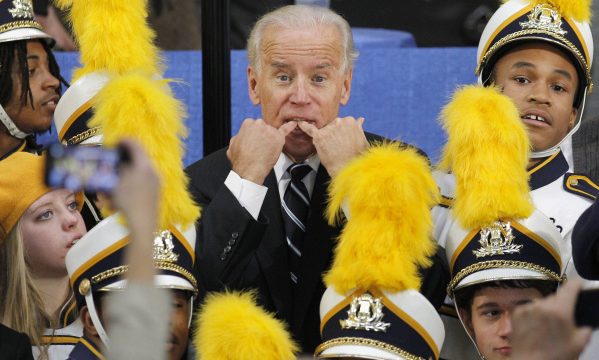On Election Eve, voters snooze through duopoly game

HEY, LOOK AT ME! Joe Biden whistles for attention at a political rally. A Pew study found that 41 percent of surveyed Americans could not identify the current vice president.
By Kenric Ward | Watchdog.org
In their ignorance, voters this Tuesday will make a case for smaller government, a George Mason University law professor predicts.
Ilya Somin, author of “Democracy and Political Ignorance: Why Smaller Government Is Smarter,” says most voters put more time into researching the type of TV they buy than into the political candidates they choose.
Somin, a self-described conservative, says political ignorance runs deep in the electorate.
SMALLER IS BETTER: Professor Ilya Somin says more Americans have concluded their votes make no difference, especially at the federal level.
“Only 36 percent know the three branches of the federal government. Just 38 percent know that Republicans control the U.S. House of Representative,” Somin told Watchdog in an interview, citing recent surveys.
By contrast, Americans will do detailed research on the televisions and cars they buy because those purchases make a difference to them.
Oftentimes, voters have little substantive choice in elections, where incumbents enjoy a large cash advantage and use that to air unctuous messages over those carefully chosen flat screens.
“You realize that your vote is infinitesimally small,” he told Watchdog.org in an interview. “It’s actually rational to be ignorant.”
If voters’ felt their votes actually mattered, they would put the same energy into researching and agitating for better government.
“If the electorate were more knowledgeable we’d have different candidates and different platforms,” he said.
Somin’s solution? Vote with your feet. If voters feel overtaxed and underappreciated, move to a city or state that is less hostile.
Evidence for the effectiveness of Somin’s solution is scant. The Free State Project, a Libertarian en masse movement to New Hampshire in an effort to control the levers of political power there, has so far made only minor inroads in the Granite State.
Somin argues that size matters.
“Many European countries are smaller than some of our states. Yet Switzerland, for instance, has better health care. They have better retirement programs,” he said. “We should learn from that and devolve issues from federal government.”
However, Somin admits, “It’s not likely that knowledge will increase” across a political landscape increasingly dominated by a powerful central government.
The problem is abetted by both major political parties.
Republicans and Democrats, using political gerrymandering and shoveling public funds back to special interests, push an elitist brand of crony capitalism that effectively shrinks the middle class.
Consumer crusader Ralph Nader says the nation’s political duopoly is too entrenched, with too little difference between the established parties.
“You don’t pick the candidates; they pick you,” he says.
Somin says rather than empowering self-serving middlemen in Washington, D.C., voters would be better served by smaller government and more private enterprise.
“Many things are handled better by private sector: education and health care to name just two,” he said.
“At least decentralize more decision making to the state or local level. And if a state becomes dysfunctional, people can move away,” Somin said. “The response to harmful federal policies is to leave country entirely. That’s costly and less probable.”
Kenric Ward is a national reporter for Watchdog.org and bureau of its Virginia Bureau. Contact him at (571) 319-9824. @Kenricward







